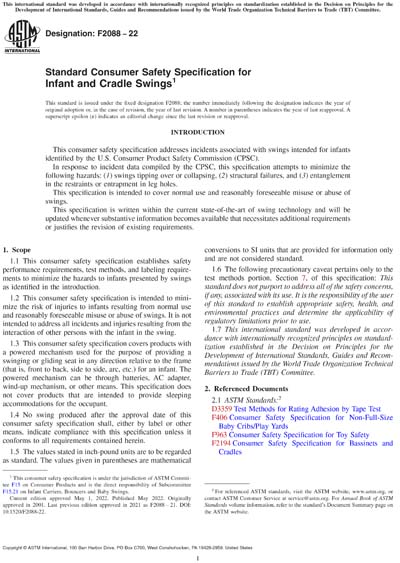Historical
ASTM F2088-22
Standard Consumer Safety Specification for Infant and Cradle Swings
1.1This consumer safety specification establishes safety performance requirements, test methods, and labeling requirements to minimize the hazards to infants presented by swings as identified in the introduction.
1.2This consumer safety specification is intended to minimize the risk of injuries to infants resulting from normal use and reasonably foreseeable misuse or abuse of swings. It is not intended to address all incidents and injuries resulting from the interaction of other persons with the infant in the swing.
1.3This consumer safety specification covers products with a powered mechanism used for the purpose of providing a swinging or gliding seat in any direction relative to the frame (that is, front to back, side to side, arc, etc.) for an infant. The powered mechanism can be through batteries, AC adapter, wind-up mechanism, or other means. This specification does not cover products that are intended to provide sleeping accommodations for the occupant.
1.4No swing produced after the approval date of this consumer safety specification shall, either by label or other means, indicate compliance with this specification unless it conforms to all requirements contained herein.
1.5The values stated in inch-pound units are to be regarded as standard. The values given in parentheses are mathematical conversions to SI units that are provided for information only and are not considered standard.
1.6The following precautionary caveat pertains only to the test methods portion, Section 7, of this specification: This standard does not purport to address all of the safety concerns, if any, associated with its use. It is the responsibility of the user of this standard to establish appropriate safety, health, and environmental practices and determine the applicability of regulatory limitations prior to use.
1.7This international standard was developed in accordance with internationally recognized principles on standardization established in the Decision on Principles for the Development of International Standards, Guides and Recommendations issued by the World Trade Organization Technical Barriers to Trade (TBT) Committee.
Content Provider
ASTM International [astm]






